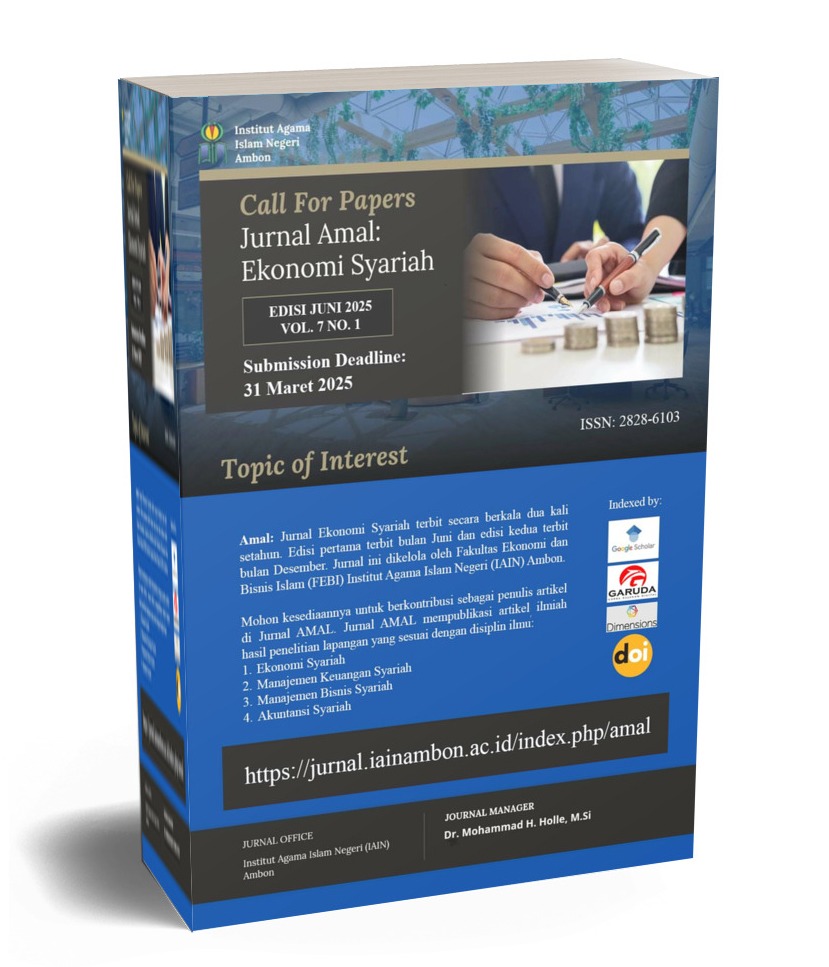Wawasan Al-Qur’an Tentang Zakat dan Kemiskinan: Studi Ekonomi Syariah di Barru
DOI:
https://doi.org/10.33477/eksy.v7i1.9564Keywords:
Zakat, Poverty, Islamic Economics, Qur’anic InsightAbstract
This study aims to analyze the effect of zakat distribution on poverty reduction in Barru Regency from the perspective of Islamic economics grounded in Qur’anic insight. Poverty remains a central issue in the region, despite the potential of zakat and the active role of zakat management institutions. A quantitative approach was employed using a simple linear regression analysis, based on secondary data from BAZNAS and BPS for the period 2020–2024. The results reveal that zakat distribution has a significant influence on reducing poverty levels, with a determination coefficient of 0.672. These findings indicate that increased zakat distribution corresponds with lower poverty rates in the area. The theoretical discussion is supported by the concept of zakat as an empowerment tool for the poor and its relevance to maqashid shariah and sustainable development goals. This study concludes that optimizing zakat distribution, particularly through productive programs, can serve as a concrete solution to localized and just poverty alleviation.
Keyword: Zakat, Poverty, Islamic Economics, Qur’anic Insight
References
Abduh, Arridho, Marliyah Marliyah, and Saparuddin Siregar, ‘Instrumen Keuangan Sosial Islam Dan Keberlanjutan Lingkungan (SDGs 13)’, Islamic Business and Finance, 5.1 (2024), pp. 42–63. http://dx.doi.org/10.24014/ibf.v5i1.28345
Afif, Mufti, and Sapta Oktiadi, ‘Efektifitas Distribusi Dana Zakat Produktif Dan Kekuatan Serta Kelemahannya Pada Baznas Magelang’, Islamic Economics Journal, 4.2 (2018), p. 133. https://doi.org/10.21111/iej.v4i2.2962
Akmal, Raihanul, and others, ‘ZAKAT PRODUKTIF UNTUK PENGENTASAN KEMISKINAN (Studi Kasus: Baitul Mal Aceh Untuk Zakat Produktif Di Kota Banda Aceh)’ (UIN Ar-Raniry Banda Aceh, 2018)
Amrullah, Nursinah, Inayanti Fatwa, and Cici Mahmut, ‘Pengaruh Zakat Produktif Dalam Bidang Usaha Mikro Terhadap Upaya Pengentasan Kemiskinan’, Jurnal Mirai Management, 8.2 (2023), pp. 400–07. https://doi.org/10.37531/mirai.v8i2.5054
Firdaus, Rayyan, and others, ‘Dampak Penyaluran Zakat Produktif Dalam Meningkatkan Kesejahteraan Mustahiq Pada Pengelolaan Zakat Di Baitulmal Aceh Utara’, E-Mabis: Jurnal Ekonomi Manajemen Dan Bisnis, 23.1 (2022), pp. 89–100
Ghozali, Imam, ‘Aplikasi Analisis Multivariate Dengan Program IBM SPSS 25 Edisi 9. Semarang: Badan Penerbit Universitas Diponegoro. Variabel Pemoderasi’, E-Jurnal Akuntansi Universitas Udayana, 23.2 (2018), p. 1470
Gujarati, Damodar N, and Dawn C Porter, Basic Econometrics (McGraw-hill, 2009)
Kuantitatif, Pendidikan Pendekatan, ‘Metode Penelitian Kunatitatif Kualitatif Dan R&D’, Alfabeta, Bandung, 2016
Maharani, Chika, and others, ‘Dampak Kemiskinan Terhadap Kualitas Pendidikan Anak Di Indonesia: Rekomendasi Kebijakan Yang Efektif’, Journal of Macroeconomics and Social Development, 1.3 (2024), pp. 1–10. https://doi.org/10.47134/jmsd.v1i3.199
Maulana, Zefri, ‘Strategi Pemberdayaan Mustahik Menjadi Muzaki Melalui Zakat Produktif Pada Baitul Mal Kabupaten Aceh Tamiang’, Jurnal Ilmiah Ekonomi Islam, 8.3 (2022), pp. 3835–44. https://doi.org/10.29040/jiei.v8i3.6285
Pelitawati, Eva, and others, ‘Pemberdayaan Ekonomi Masyarakat Melalui Zakat Produktif: Refleksi Dari Kitab Al-Amwal Karya Abu Ubaid’, Blantika: Multidisciplinary Journal, 3.3 (2025). https://doi.org/10.57096/blantika.v3i3.293
Sulaiman, Endang Sutisna, Pemberdayaan Masyarakat Di Bidang Kesehatan: Teori Dan Implementasi (Ugm Press, 2021)
Syamsuri, Syamsuri, and Alfiya Utami, ‘Zakat Produktif Untuk Peningkatan Pendapatan Masyarakat Miskin’, Innovative: Journal Of Social Science Research, 4.5 (2024), pp. 4161–75. https://doi.org/10.31004/innovative.v4i5.15421
Downloads
Published
How to Cite
Issue
Section
License
Copyright (c) 2025 Achmad Riady, Achmad Abubakar, Muhammad Irham

This work is licensed under a Creative Commons Attribution-NonCommercial-ShareAlike 4.0 International License.
This work is licensed under a Creative Commons Attribution-NonCommercial-ShareAlike 4.0 International License









